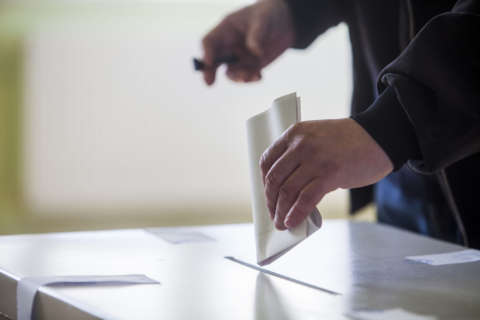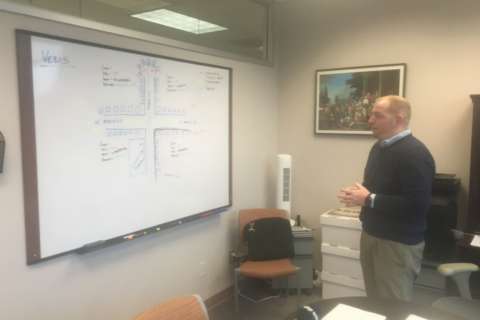RICHMOND — A Virginia commonwealth’s attorney has warned prosecutors statewide Wednesday against prosecuting certain voter registration fraud cases, due to concerns raised by Virginia registrars.
In an email obtained by WTOP through a Freedom of Information Act request, Chuck Slemp, commonwealth’s attorney for Wise County and the City of Norton, said he has dropped prosecutions in “several cases” where it initially appeared that felons were trying to register to vote through the Department of Motor Vehicles, because he cannot be completely sure any data in the system is accurate.
“I believe that all Commonwealth’s Attorneys should be made aware of this issue because there may be a considerable risk of unfair prosecution of certain individuals statewide,” the email forwarded on Slemp’s behalf said.
WTOP first reported the concerns earlier this week. In a phone interview, Slemp called the risk of faulty convictions a prosecutor’s worst nightmare.
The Department of Elections has downplayed the concerns, and Elections Commissioner Edgardo Cortes said again Thursday that the root problem comes from registrars who printed forms that were meant to be entirely electronic, thus putting address update requests on the same form as pre-existing voter registration information, including whether the applicant said he or she is a citizen, a felon or mentally incapacitated.
When the forms were printed, voter signatures appeared to show the questions had been answered under penalty of perjury. Cortes said a live link from the Department of Motor Vehicles to the state voter registration system meant the questions had been previously answered and verified during earlier transactions.
Brandy Brubaker, a spokeswoman for the Department of Motor Vehicles, said anyone already registered in the state voter registration system is only asked whether he or she wants to update their voting address when making a change, while people moving from out of state or who are not registered are asked all qualifying questions.
Since complaints were raised, the state system now does not show those answers when registrars print the address update requests. Several registrars described that as an erasure of data by the state.
Cortes said it is simply a change of what is displayed to ease the issues that have come up, as registrars have had to get used to an electronic-based system rather than the old paper-based rules.
Sasnett won’t budge
Citing these concerns, Fairfax County Registrar Cameron Sasnett has already refused to process address changes submitted through the DMV for now. Cortes said he had referred Fairfax County Registrar Cameron Sasnett to the Office of the Attorney General, since all proper voter registrations and address updates must be processed.
Sasnett said Thursday he will not budge, and has halted processing any pending address update transactions submitted through the Department of Motor Vehicles until he gets a final and sufficient explanation about what is going on with the data, or can separately verify eligibility.
Sasnett is also asking Fairfax County Commonwealth’s Attorney Ray Morrogh’s office to investigate.
In the meantime, Sasnett said, the registrations are on hold pending additional verification of each voter’s eligibility.
Sasnett and other registrars did not have concerns about new voter registrations through the DMV for people just turning 18 or moving in from out of state.
Slemp said he had been alerted “numerous” times by the registrar of felons attempting to register to vote by apparently lying on voter registrations submitted through the Department of Motor Vehicles, leading to charges in about 10 cases.
“While we were preparing for trial on these cases, and on the day before we were set to enter into a plea agreement on one, we discovered a huge problem,” Slemp wrote his fellow prosecutors.
The state system had apparently automatically populated answers on the printed forms in registrars’ offices, and has since been changed to prevent those answers from showing up when the forms are printed for the same transaction.
“We cannot be certain that any record in the … database is correct at this stage,” Slemp wrote.
Close calls
In a phone interview, Slemp said he was not certain of who might be to blame for the issues.
A motion to drop the charges filed Nov. 30 suggested he would like to see the state ask more questions of people before submitting their voter registration updates. Federal voting laws sometimes prohibit that.
The charges were dropped in several cases just as a woman was about to plead guilty to lying on a voter registration form. The local registrar notified Slemp that changes to her record in the state voter registration system meant the answers that formed the basis of the prosecution no longer showed up.
“So the document that we indicted on is no longer the official record,” Slemp said “I know that people have been indicted; they’ve put up bonds, they’ve spent nights in jail — heck, we had one almost convicted.”
At least two more of the forms have been sent to Slemp since Nov. 30, he said, each of which he has declined to prosecute. It can take a few months between the submission of an application and a complaint making its way to prosecutors, and the state only made changes to the displayed answers this fall.
The first cases came up early last year — including for a man convicted shortly before the address update, Slemp said.
“This guy’s a felon; I convicted him. It wasn’t six months after he had been convicted that the guy had applied to vote twice” through the DMV system, Slemp said.
The Department of Motor Vehicles and Department of Elections said the system has been extremely valuable, and remains operational with recent tweaks requested by local registrars.
Slemp was clear he is not blaming the DMV necessarily, since he is not clear on where the problem lies.
“The General Assembly … someone ought to have an investigation as to what went wrong, and what is the extent of what we can trust these forms,” Slemp said.







